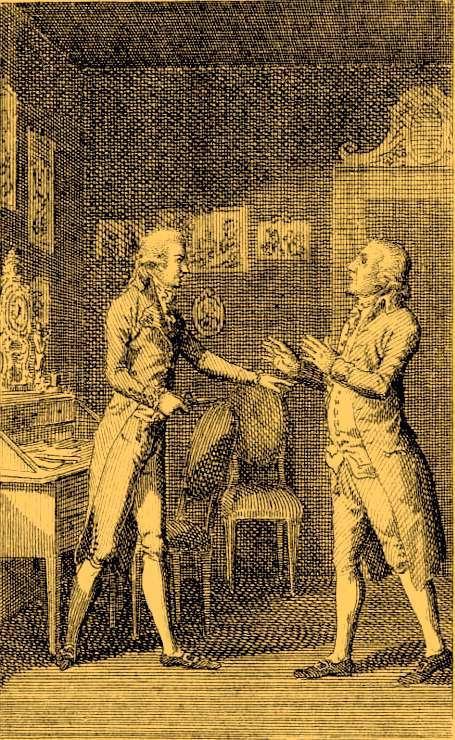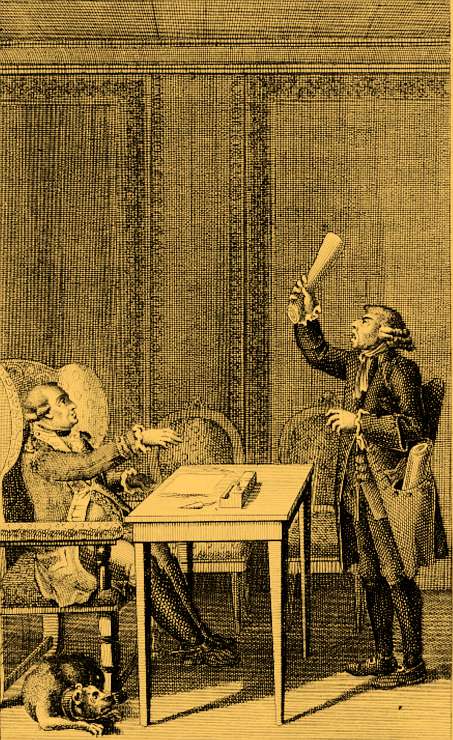• 309. Wilhelm Schlegel to Caroline in Braunschweig: Berlin, 18 April 1801 [*]
B[erlin], 18 April [180]1
Dearest Caroline,
|100| This week some extremely irksome business matters have crossed me up and prevented me from following up on my resolution to write ahead of time. Hence you must make do with a rather short letter; but, then, you, too, are writing me short letters, which leaves all the more for us relate in person later.
The matter that has just erupted with Unger is the following. He has printed the 1st volume of Shakespeare anew; the whole thing was finished before I even arrived here. Although he did not say a single word to me about it, I picked up on it from all sorts of other signs, including that he printed copies not only on vellum, but also on writing paper. It took a while before I was able to clarify what was going on, but finally I received a copy of the new printing on vellum; in a certain way he actually did not disguise it, since a copy I myself had revised and in which the foreword had been crossed out etc. was used as the basic text in any case, and also the date set on the title page.
I went to him and, to spare him any and all shame, told him in the most cordial manner possible that I was very happy to see that things had moved so far along that he was already able to have a second printing done of the first volume, but that he |101| would now doubtless find it wholly reasonable that I be paid the outstanding honorarium commensurate with the print run of this edition. He did not give me any problem in this regard, maintaining that he had printed 100 copies on vellum, that he did not know off the top of his head how many on writing paper but would show me the number in his accounting books; the whole thing came about, he maintained, only that one might be able to do the vellum printing all the more cleanly, that he still had a number of copies on writing paper from the first printing (which genuinely is true) etc.
I waited, expecting him immediately to take me with him to his cashier’s desk to set these things straight, but in vain; in the meantime, I did not want to become discourteously persistent, so I left. [1]
The next day, I ate lunch at his place, where, rather crazily, he had invited me along with the entire Berlin scene (Gedicke, Zöllner, and Teller), with whom I also had a bit of fun locking horns with regard to Fichte’s censorship affair. [2] During the meal he remarked to me that he had indeed checked and found that 100 copies on vellum and 300 on writing paper had been printed, hence only as many as would make the print run of volume 1 the same as the present one.
Of course, there was nothing I could say in response, but I then waited for a few days after that to see whether he might come or might send money; finally, when nothing happened, I wrote him a billet to the effect that I was taking the liberty to remind him of his promise to show me in his bookkeeping just how large the print run of this edition was and what the sales figures were to this point. I had already demanded beforehand 8 louis d’ors for the 100 vellum copies, and for the rest I thought 4 louis d’ors per hundred was a reasonable estimate.
In response he wrote me an infinitely coarse letter about the heartlessly arrogant people with whom he has often had to deal and yet who have never demanded to see his books; and that he had no intention of showing them to me; that he intended to grant me 10 louis d’ors for the new print run, but now he intended |102| to throw it all into the maculature for Hamlet etc. [3] From now on our association would be ended, and he did not wish to publish Shakespeare any further etc. — quite like a letter written by a possessed person inspired by the Ungermonster.
The only thing that especially irked me was that he preempted me in breaking off the relationship, since I had already planned not to deal with him any further except with enhanced conditions and a formal contract concerning the strength of the print run etc. Of course, I did not respond to him at all, but went instead to the justice minister Grattenauer, whom I believe I have already mentioned to you; he is a skilled jurist who is, however, also interested in literature and who sought me out several times after his return from Warsaw; he is a friend of Bernhardi.
He believes that something can indeed be done legally and has taken the matter into his own hands with the most accommodating zeal. Prussian law, it seems, distinguishes between a new print run and a new edition. A publisher may undertake the former if no fixed determination was made concerning the size of the first printing; for a new edition, however, he must pay half the initial honorarium, hence exactly what I demanded: 20 louis d’ors. —
Now, Grattenauer believes he can successfully demonstrate that it is a new edition, since it was printed with various larger and smaller deviations according to a copy which I myself had revised. He first tried the path of cordiality and wrote directly to Unger but has as yet received no answer. If nothing happens, the complaint will be filed perhaps on Monday, and Grattenauer has promised to hasten it as much as possible by pointing out how I am a non-resident etc. —
Because I had sent the first copy I had back to a bookseller here and needed another in order to verify the deviations, |103| I had Frölich send me one. Shortly thereafter I received a note from Unger saying that a copy had been distributed to Frölich without his foreknowledge and that he had strictly forbidden his people to continue to do so, that he intended to turn the entire print run into maculature and claim to have printed it at a loss. He sent virtually all his employees to Frölich to retrieve that copy, which, however, naturally remains in Grattenauer’s hands.
That is how things stand now. [4] There is no question that I will be able to sell the following volumes of Shakespeare more advantageously — in the meantime, though, it might require that I travel to Leipzig, to the book fair, something I am extremely loath to do for the following reasons.
Friedrich Tieck may be arriving from Paris any day now; his sister is expecting him without any further announcement. [5] He will doubtless come here first rather than Dresden, and perhaps not even go to Dresden the entire summer, since he probably must cultivate his relationships here even though they may have been rather unfavorably influenced by his former teacher in the meantime (who has not exactly come across as the most liberal or decent person in that regard). App[ointments?] in person . . .
[End of sheet.]
Notes
[*] At issue in this letter is a dispute with the Berlin publisher Johann Friedrich Unger concerning what Wilhelm views as an unauthorized and even underhanded reprint (1801) of the initial (1797) volume of his edition of Shakespeare:

[1] Calendar für das Jahr 1796; Inhaltsverzeichnis deutscher Almanache, Theodor Springmann Stiftung

[2] Daniel Nikolaus Chodowiecki, Und ich zur ewigen Glückseeligkeit bestimmt werde herzlich lachen, wenn Ihr verdammt werdet (1781); Herzog August Bibliothek; Museums./Signatur Uh 4° 47 (232):

Erich Schmidt, (1913), 2:735, misidentifies “Teller” here as the actress Marie Luise Teller; see Caroline’s letter to Wilhelm on 10 December 1801 (letter 335).
The reference is to Fichte’s satire on Friedrich Nicolai, Friedrich Nicolai’s Leben und sonderbare Meinungen. Ein Beitrag zur Litterargeschichte des vergangenen und zur Pädagogik des angehenden Jahrhunderts, whose publication the Berlin High Consistory had censored on 26 March 1801 because of its insulting tone.
Although Fichte then gave up on the piece, Wilhelm took over publication in Jena, where as a professor he could still publish without censorship (his name appears on the title). See in general Caroline’s letter to Wilhelm on 27 April 1801 (letter 312). Back.
[3] Makulatur, sheets damaged or otherwise compromised or spoiled during printing that were then often either discarded or, e.g., used as lining to conceal bindings or interleave interior pages; printing remainders could be turned into such discards or waste paper. Back.
[4] Gottlieb Böttger der Ältere Diskussion zwischen zwei Männer [1799]; Herzog August Bibliothek; Museums./Signatur Graph. A1: 243:

Ultimately this tiresome dispute with the publisher Johann Friedrich Unger fatefully delayed the translation of Shakespeare (see Wilhelm’s letter to Johann Friedrich Cotta on 23 April 1801 [letter 310c]).
Although the dispute continues to play a role in these letters and is annotated accordingly, Josef Körner succinctly recounts its course in his notes to Wilhelm’s letter to Unger from Berlin toward the end of 1801 (letter 338a) after Wilhelm had essentially lost his lawsuit but had not been able to find another publisher to continue the Shakespeare translations (some of the details of the “amicable” settlement are noted in connection with later letters).
Although some of the same features of the dispute are addressed in connection with later letters, Körner’s account provides a useful premonitory overview; see supplementary appendix 309.1. Back.
[5] Wilhelm had been contemplating engaging Friedrich Tieck to do the monument for Auguste in Bocklet. See Wilhelm’s letter to Ludwig Tieck on 14 September 1800 (letter 267e), Caroline’s letter to Wilhelm on 5–6 March 1801 (letter 296), and Friedrich Tieck’s own letter to Wilhelm on 24 April 1801 (letter 311b).
Friedrich Tieck arrived in Weimar from Paris in early September 1801 (see Wilhelm to Sophie Bernhardi on 4 September 1801 [letter 328f]) (Daniel Nikolaus Chodowiecki, “Elementarische Landkarte von Europa,” in Kupfersammlung zu J[ohann] B[ernhard] Basedows Elementarwerke für die Jugend und ihre Freunde: Erste Lieferung in 53 Tafeln. Zweyte Lieferung in 47 Tafeln von L bis XCVI [Leipzig, Dessau, Berlin 1774], plate xl):

See also Wilhelm’s letter to Sophie Bernhardi on 21 August 1801 (letter 327f), and in general the supplementary appendix on Auguste and the cemetery in Bocklet. Back.
Translation © 2015 Doug Stott
